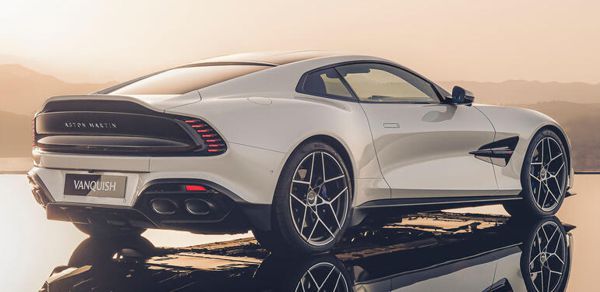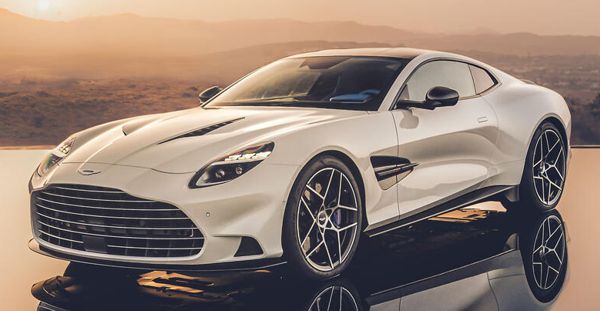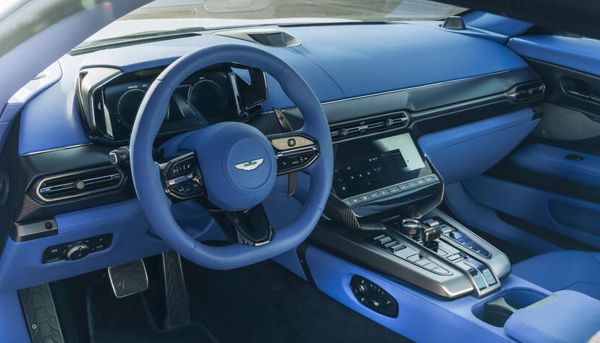
| 3 Sep, 2024 |
||||||||||||||||||||||||||||||||||||||||||||||||||||||
| Aston
Martin Vanquish III |
||||||||||||||||||||||||||||||||||||||||||||||||||||||
 This is the latest generation of Aston Martin's flagship GT, succeeding the Vanquish I (2001), Vanquish II (2012) and DBS Superleggera (2018). Compared with the outgoing final edition DBS 770 Ultimate, power and performance have been lifted further, so is its pricing - now up to £333,000, though still cheaper than its closest rival Ferrari 12Cilindri. The new Vanquish is still unmistakably an Aston Martin, but its design language evolves further to set it apart from its predecessors or other Aston models. The key new feature is a Kamm tail with integral rear spoiler and a rear quarter window with its trailing corner cut. Triangular vents aft of the front wheels also differentiate it from before. Up front, it is more familiar. The massive grille gets even larger, i.e. 14 percent larger than that of the DBS 770 Ultimate. In fact, it is so large that I doubt if there is any space for further expansion. The car is larger as well. 4850mm long and 2885mm in wheelbase, making it 138mm and 80mm longer respectively than its predecessor. That's huge for a strictly 2-seater! It weighs more, too, tipping the DIN scale at 1835 kg, or 1774 kg dry, making it 65 kg heftier than the DBS 770, even though it employs full carbon-fiber body. Fortunately, weight is well distributed between both axles, i.e. 51:49, thanks to keeping transaxle layout.  Like other Astons, the chassis is constructed of extruded and bonded aluminum frames. Strengthening around the engine, suspension mountings and underbody yields a 75-percent increase of lateral stiffness, providing a stronger basis for the new Bilstein DTX adaptive dampers (from DB12) and thicker anti-roll bars to work on. Standard carbon-ceramic brakes keep unsprung weight low while signifies the car's flagship status. To handle increased power, wider tires are fitted: 275/35ZR21 up front and 325/30ZR21 at the rear. These Pirelli P Zero PZ4 rubbers employ bespoke compounds. What separates the flagship GT from lesser Aston models is the powertrain. Instead of AMG-sourced V8, it keeps using the "Cologne" V12 motor which debuted on DB7 Vantage back in 1999. The latest version remains a twin-turbo 5.2-liter unit, but most parts have been modified, such as a strengthened block and con-rods, new cylinder heads with CNC-machined combustion chambers and modified ports, repositioned spark plugs, new cam profiles, higher flowing injection and a 50% larger oil cooler. Moreover, the new turbochargers feature lower inertia turbines so that they can spin 15 percent faster and have quicker response. New "Boost Reserve" function controls throttle and wastegate to keep boost pressure high during momentary part-throttle, so that full boost can be attained immediately when full throttle is applied again. As a result, the new V12 produces 835hp at 6500 rpm and 737 lbft at 2500-5000 rpm, 65 horsepower and 73 lbft more than the DBS 770. It goes without saying this is the most powerful V12 ever built by Aston itself - ignoring the Valkyrie's Cosworth-built unit of course. The new V12 complies with Euro 6e emission standard and noise regulations, so that its future is guaranteed until 2030. As electrification is proved to be uninteresting to exotic car buyers lately, Aston's U-turn on hybridization and re-investing into the V12 motor seems to be a wise move.  As the final drive ratio is optimized for top speed rather than acceleration, the new Vanquish's 0-60 mph sprint is improved by just a tenth of a second to 3.2, but its terminal speed is lifted to 214 mph, a new height for the company's production cars. The ZF automatic transaxle partners with an electronic differential for the first time. As the latter's control system is linked to ESP and ABS, expect the new Vanquish to display much improved handling at the limit. Inside, there is not much drama. It uses the company's home-grown infotainment system from DB12, featuring a 10.25-inch touchscreen. The instrument is a display, while the switchgears lack the bespoke feel and visual appeal of Bentley. However, a standard panoramic glass roof should give the cabin an airy and more spacious feel.
|
||||||||||||||||||||||||||||||||||||||||||||||||||||||
| |
